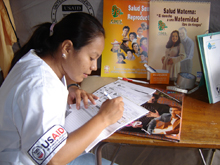
Health on the Highway: Study Assesses Impact of New Route in Bolivia and Peru
Frontier areas along the border between Bolivia and Peru are now more accessible due to the recent completion of the transoceanic highway linking Peruvian ports on the Pacific Ocean with Brazilian ports on the Atlantic. Along with the commerce, migration, and truck traffic spurred by the highway will come likely increases in the incidence of HIV, tuberculosis, and other communicable diseases in the border region, as well as a general hike in the demand for health services.  To learn more about the capacity of the health workforce in the region to meet the current needs as well as the anticipated increase in demand for HIV and other health services, CapacityPlus conducted a rapid assessment of HIV/AIDS human resources in the border areas in September and October. The assessment team conducted a regional workshop for health leaders to discuss the findings of the study in November in Puerto Maldonado, Peru. The 28 participants—including Ministry of Health and USAID officials, health workers, and health services administrators and managers—addressed five key themes identified by the assessment: HIV/AIDS service provision gaps and recommendations; incentives for health workers serving in remote areas; the potential impact of the highway on HIV/AIDS-related services; identification and strengthening of strategic alliances; and collaboration among health leaders from Peru, Bolivia, and Brazil.
To learn more about the capacity of the health workforce in the region to meet the current needs as well as the anticipated increase in demand for HIV and other health services, CapacityPlus conducted a rapid assessment of HIV/AIDS human resources in the border areas in September and October. The assessment team conducted a regional workshop for health leaders to discuss the findings of the study in November in Puerto Maldonado, Peru. The 28 participants—including Ministry of Health and USAID officials, health workers, and health services administrators and managers—addressed five key themes identified by the assessment: HIV/AIDS service provision gaps and recommendations; incentives for health workers serving in remote areas; the potential impact of the highway on HIV/AIDS-related services; identification and strengthening of strategic alliances; and collaboration among health leaders from Peru, Bolivia, and Brazil.
The workshop validated the assessment’s findings and generated a high level of enthusiasm among participants to focus on the issues and potential solutions. Key priorities identified by the group include addressing incentives and capacity-building for health workers, developing an integrated health information system, standardizing HIV/AIDS protocols, and establishing sustained communications and agreements among the three countries to strategically address HIV/AIDS-related issues through regional approaches. The study and workshop were funded through USAID’s Latin America and the Caribbean (LAC) Bureau.
Related items:
Photo by Rebecca Gustafson, courtesy of USAID. (A health worker in Bolivia fills out a patient intake form)


